Solo is one of my favorite aspects of an Outward Bound course to facilitate. We find a remote, wild spot, and open an experience that our students are unlikely to be able to re-create on their own—the feeling of being alone in the wilderness, but with help nearby if needed. The students do the work themselves, and it’s intensely personal, somewhat unpredictable and potentially life-changing. Here’s a sampling of some of my students’ most memorable experiences with Solo.
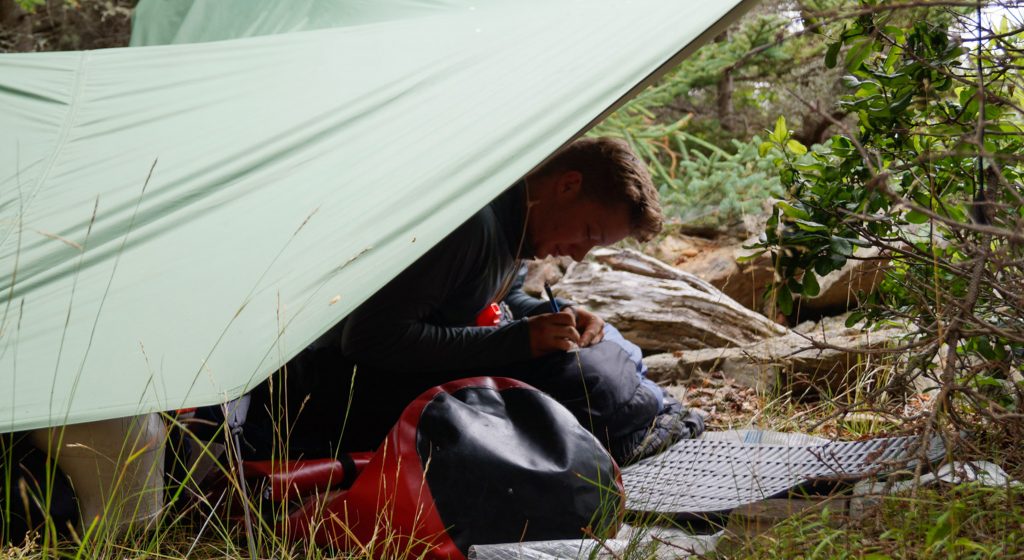
Photo by Amber Bolduc
*Names and identifying details have been changed to protect the privacy of individuals.
#1
Rose began her expedition as a newcomer to all things out-of-doors. She screamed when she saw bugs and preferred not to sit on the ground. Rose was open about her fears around the Solo experience. As our expedition progressed, she studiously mastered all of the knots, determined to build herself the driest and sturdiest tarp shelter possible during her time on Solo. When I showed Rose her Solo site and prepared to paddle away, she had tears in her eyes. We reviewed what she should do before sunset to be ready for her first night. I came back at dusk to check on her, and though still nervous, she had set up the best shelter of any of our students. Whether or not she slept, she would be protected from the elements. I returned the next morning, and found her sitting on a rock by the water, her posture open and her face beaming. She greeted me by telling me how much she loved Solo, and how she felt free.
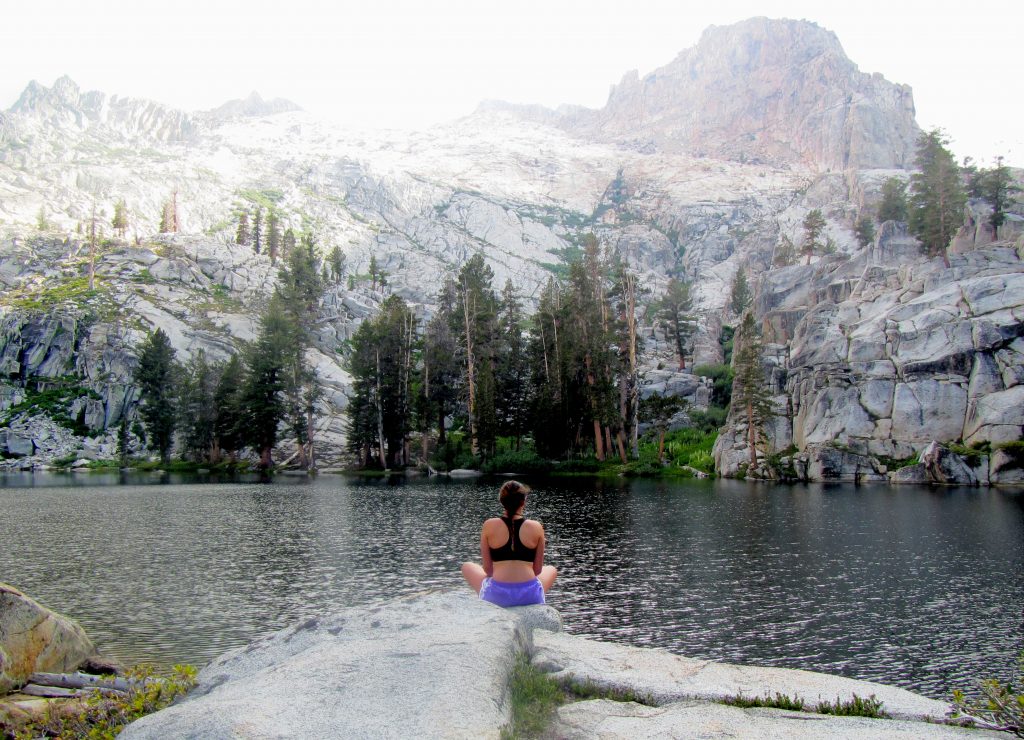
#2
Tommy was the extroverted, self-appointed leader of our group. He was full of jokes and energy, always ready for the next adventure in our course. His team began their Solos at sunset, and by sunrise, he was blowing his emergency whistle. My co-Instructor told me he could see Tommy standing on shore, waving and blowing his whistle. We grabbed the first aid kit and paddled over. When we asked him what was going on, he gave us an extensive list of concerns. He was cold and needed more warm clothes. The trees were moving in the wind, and he was worried they would fall on him. He had heard wolves breathing on him during the night. He was lonely and missed having people to talk to. We gave him tips on staying warm, and discussed the risks regarding wind and wolves. We knew he really wanted us to stay and talk, but that wouldn’t be much of a Solo, would it?
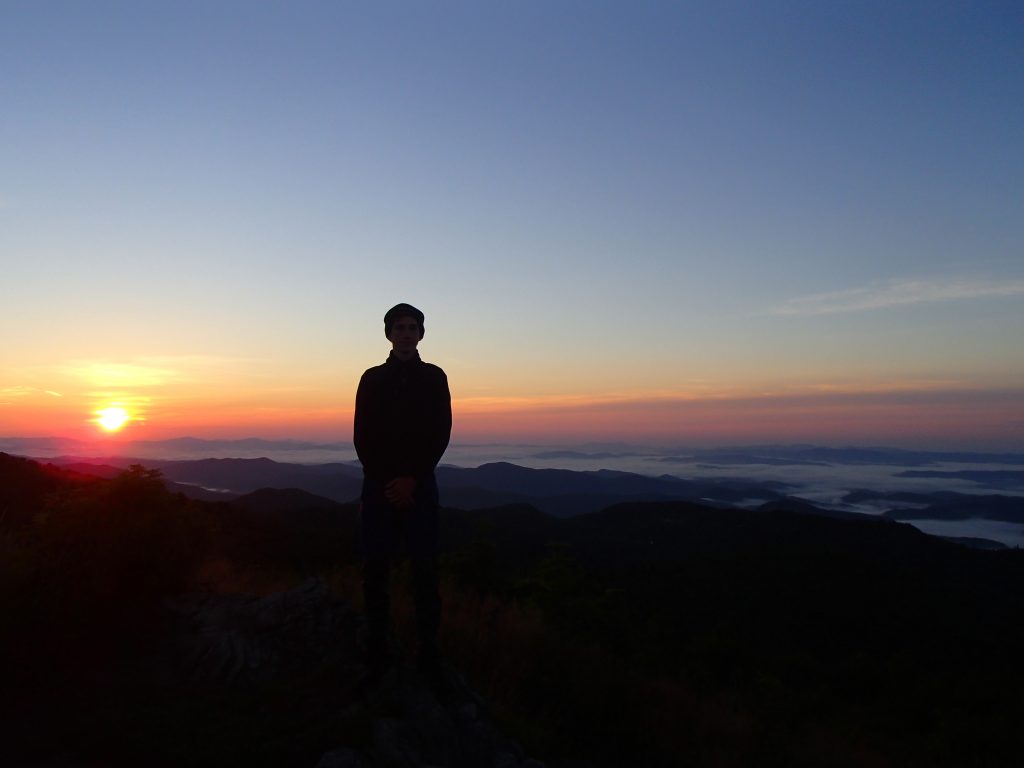
#3
John informed us on day three of our expedition that he didn’t eat vegetables. We knew the course would push him to do many new and difficult things, like traveling with strangers, sleeping in tents and getting out of the tent on rainy days. We decided not to make his experience about the vegetables and reached an agreement that he would talk to the cooks each night about dinner. He would make a plan to help if the vegetables needed to be cooked on the side (on his account). This system worked for the most part, and John got the feeling of being in control of his food, which helped him, and he was eating food, which was necessary for him to have the energy to travel. A few honest mistakes were made, and John proved agreeable as he got to know his crew-mates better. We learned he had no problem with beans, corn or potatoes—which he didn’t consider vegetables. The group had three nights scheduled for Solo, and my co-Instructor and I cooked the group dinner on the second night to supplement the “squirrel bags” of crackers, fruit, nuts, granola bars and candy they’d been given. We cooked up a delicious stir-fry with cabbage, carrots and onions mixed in. We paddled around the lake with the hot pot of food in the front of the canoe, doling out heaping bowls of stir-fry to each student. John made a face at us when he saw his bowl, but when we checked on him the next morning, he had a revelation for us. He liked vegetables!
#4
As a student myself at 15, I was excited for Solo. We had two nights of Solo scheduled, and my goal was to stay up the whole first night, watching the stars and thinking. I sat on a rock by the water with my journal and headlamp. I kept the headlamp turned off, challenging myself to not be afraid of my surroundings. I watched shooting stars and airplanes flying overhead, set goals for the next year of my life, and got cold sitting still on a rock for so many hours. At one point, I heard an animal approach. It moved closer and closer until I was sure it was within arm’s reach. Curiosity or nerves got the better of me, and I turned on my headlamp to see a giant bullfrog staring back at me. I laughed and turned my headlamp off. Sometime in the wee hours of the morning, I gave up and went to bed, sleeping late into the next day. I’d had a quiet night, feeling very alone under the big sky, which was what I wanted, and it didn’t matter much to me that it wasn’t the full night I’d set out for.
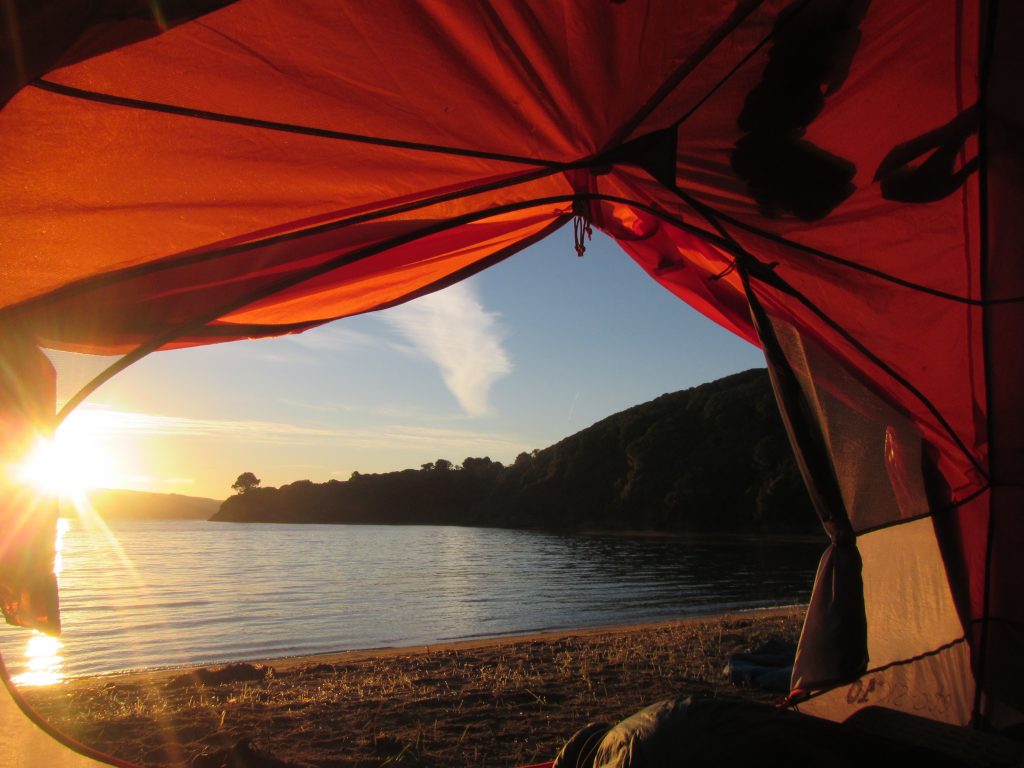
#5
My co-Instructor and I split up our student group and dropped them off at their various Solo sites. We reconvened an hour later at our site, and began our own chores, like putting away gear under a tarp and setting up our own tent. As we attached the poles to the tent, rain began to pour. We abandoned the tent and hid under the gear tarp. It rained hard. Then, just as quickly as the rain arrived, it was gone. The sun came out, and we went to inspect our tent. We hadn’t finished setting it up, and it had filled with rain. There was standing water in the tent. We laughed at our ridiculous situation but quickly wondered how our students were faring. We left the wet tent for later, emptied the water out of our canoe and left to check on each student. I fully expected to find at least one student standing on the shore in their rain gear, all of their supplies at their feet in a wet heap. We were impressed and relieved to find that each of our students had set up their tarp shelters and weathered the storm, tucked inside. We, the Instructors, were the only ones who hadn’t stayed dry!
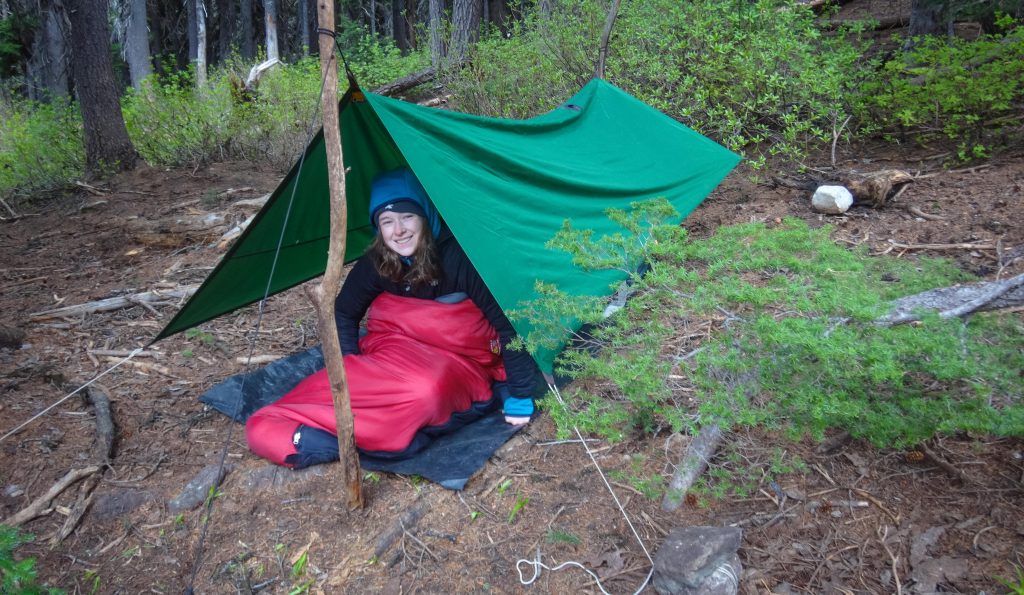
Photo by Luke O’Neill
#6
Kelly found a fishing rod missing its reel in the early days of our expedition. She packed it with her belongings and carried for the next week, waiting for Solo. When Solo arrived, I helped her thread fishing line through the guides and tied a hook on the end of the line. When we came around to check on her after several hours, she’d gotten the line snagged in a pine branch above her head, trying to make her first cast. Undeterred, she’d moved onto washing all of her clothes and rigging a dry line.
#7
Luke’s Solo site was directly across the lake from ours. His shelter was set up back from the shore in a flat, grassy spot, but beside that spot were boulders and cliffs. Around midday on the first full day of Solo, we spotted Luke lying on his sleeping pad in a flat shelf in the cliff, a few feet off the ground. The crack in the rock was such that he could roll into it, but not sit up. He was sunning himself like a lizard in the rock, very pleased with his discovery.
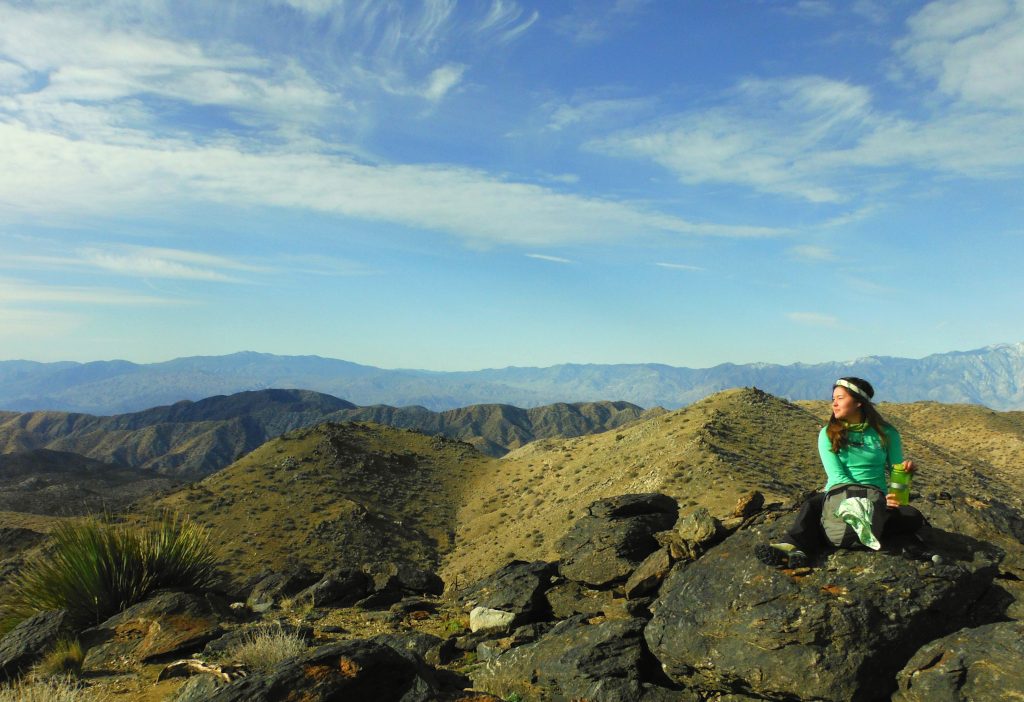
#8
On the last day of Solo, we paddled around and gave each student instructions for the next morning. We would yell and make a bunch of noise in the middle of the lake at sunrise, which would serve as their alarm. After that they were supposed to pack up their belongings and stand on the shore. We would paddle around and pick everyone up in silence, and then break the Solo when we were all gathered back together at the main campsite. When we paddled around at sunset to make sure everyone was all set for the night, we were surprised to see Mary standing on the shore with all of her belongings. “What’s going on?” I asked. She was ready to go, because Solo was over, right? “No, it’s not over until tomorrow morning,” I said. It turned out Natalie had taken a nap in the afternoon, woken up at sunset, mistaken it for sunrise, and packed up her gear, assuming she’d slept the whole night. We helped her set everything back up as night fell.
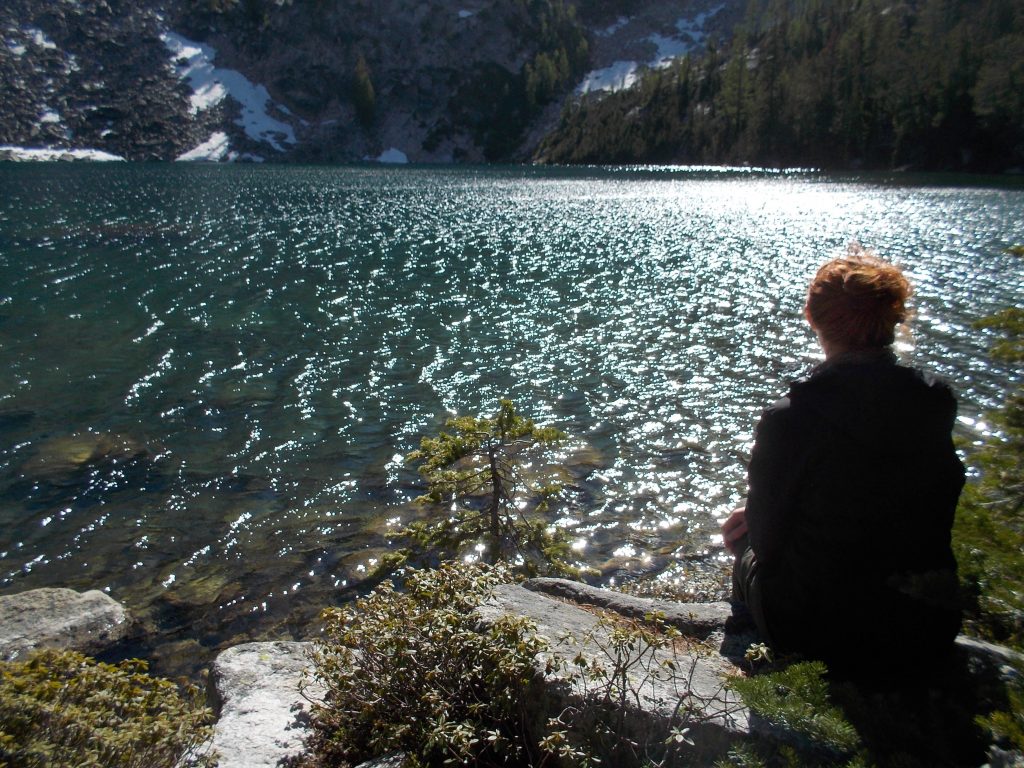
Solo provides an opportunity for introspection, as well as rest and nature play. Groups come together stronger after they’ve had time apart, with a clearer picture of what each member wants out of the remaining expedition. While we may strive to find a quiet moment in our day-to-day lives, nothing compares to spending several days alone with your thoughts in some of the most remote and beautiful places.
About the Author
Renee Igo was an Outward Bound student at age 15, and has been instructing wilderness expeditions for the Voyageur Outward Bound School for the past eight years. When not instructing, she holds a variety of other teaching positions and raises sheep in Maine.
OTHER POSTS YOU MAY LIKE
Read More
Read More
Read More




